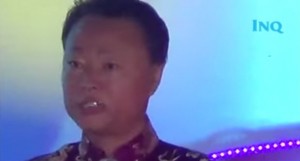We can’t go on like this, says Chinese envoy on PH ties
MANILA, Philippines–China and the Philippines should work to improve their relations which had been adversely affected by their conflict in the South China Sea, Chinese Ambassador to the Philippines Zhao Jianhua said Monday night.
“It should not go on like this,” Zhao said during a reception of the 65th anniversary of the founding of the People’s Republic of China at Shangri-La hotel in Makati.
Zhao also insisted that the “overall situation in the South China Sea is stable and there is no problem with freedom of navigation” there.
“China does not approve of exaggerating and still less sensationalizing the so-called tension in the South Sea,” he said, adding that Beijing finds it best to resolved disputes through consultation and negotiations with the concerned countries.
As Zhao made this speech, Foreign Secretary Albert del Rosario on the same day spoke before the United Nations General Assembly in New York, telling the world body of China’s continued expansion moves in the South China Sea and the Philippines’ intentions to keep the peace in the disputed area.
Article continues after this advertisementDel Rosario did not mention China directly in his speech, only referring it as a “State Party” whom the Philippine government had invited for a peaceful settlement of their maritime dispute through the UN arbitration tribunal.
Article continues after this advertisementThe government had filed a case against China over its nine-dash line claim where Beijing is claiming almost the entire South China Sea, which included the Philippines’ exclusive economic zones. Early this year, it submitted a 4,000 page memorial to counter Beijing’s nine-dash line claim.
China has refused to participate in the proceedings but the UN tribunal has given it until December to submit its counter-memorial.
“Instead of peacefully resolving the maritime disputes within the framework of Unclos, said State embarked on a series of dangerous, reckless and forceful activities in an attempt to impose unilateral change in the maritime status quo of the South China Sea,” Del Rosario said, adding that these had escalated tensions and threatened peace and stability in the South China Sea.
